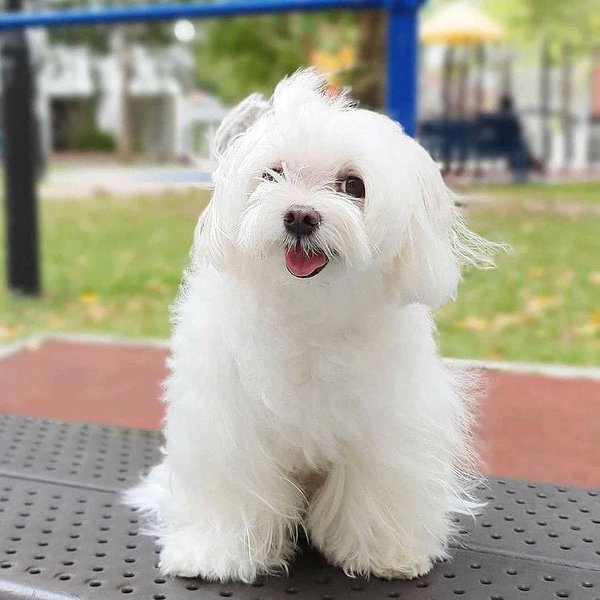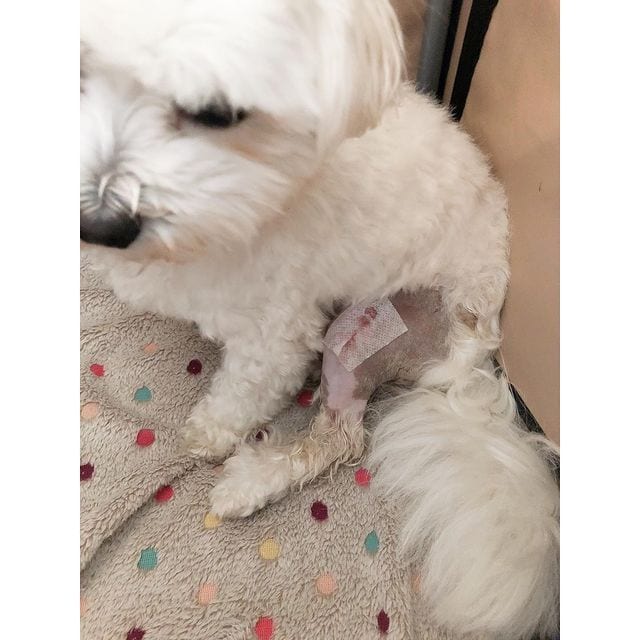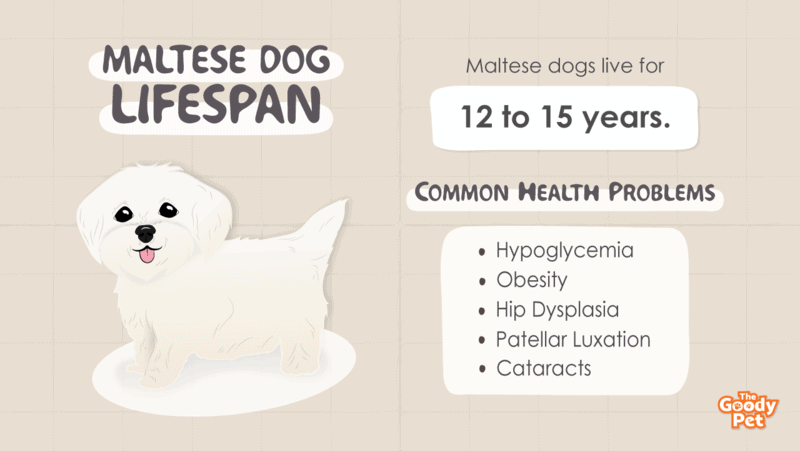Maltese dogs are one of the longest-living breeds, with a life expectancy of 12 to 15 years.
While this is good news for Maltese owners, it also means that they may have to deal with some health problems associated with old age. Some of the most common health problems seen in senior Maltese dogs include arthritis, heart disease, kidney disease, and cancer.
As your Maltese dog gets older, it is important to keep an eye out for any changes in its health or behavior. If you notice anything unusual, be sure to take them to the vet for a check-up.
With proper care and treatment, many senior Maltese dogs can enjoy a high quality of life well into their golden years.
How Long Do Maltese Live?

Maltese dogs live for 12 to 15 years.
This is to be expected as most dogs in the same size category have lifespans in the same range. For some perspective on just how impressive this lifespan is, 12 to 15 dog years corresponds to about 54 to 76 human years.
Though the reasons for their longevity are not fully understood, it is thought that their small size, lack of genetic diseases, and active lifestyle may all play a role.
Small Build
Typically small dog breeds usually live longer. There are many theories to support this, including the belief that metabolic activity in smaller pooches leaves their cells healthier for longer.
Whatever the case, Malteses definitely benefit from their small build. However, this is not always the case.
Teacup Maltese dogs actually have a bit of a shorter lifespan, with some dying as early as ten years of age. This is due to a combination of both dwarfism-related health issues and their vulnerability to suffering serious trauma.
Non-Threatening Health Issues
Another reason why standard-sized Maltese dogs live such long lives is the fact that most of the very few health issues associated with the breed are actually not usually life-threatening. As you will see shortly, they mainly affect the quality of life and are otherwise unproblematic.
Largely Unproblematic Genetics
There are several dog breeds out there that are more prone to some genetic issues than others. This is not the case with Malteses. Dogs in this breed that do have health issues usually do not reproduce, which further contributes to the overall healthy nature of the dogs.
What Health Problems Do Maltese Have?

As earlier alluded to, Malteses have very long lives, but they are not entirely free of diseases. If you are interested in owning one of these dogs, here are a few of the key health issues you may have to deal with at some point in time.
Hypoglycemia
Maltese dogs have a very high metabolism. They are very active and easily burn through whatever calories they consume. They are therefore very likely to develop hypoglycemia, especially after playing too much.
This is one of the main reasons why Maltese dogs shake so much. Serious cases could also result in loss of consciousness.
Obesity
Not all Malteses are firecrackers. There are some that, if allowed to, can very easily settle into couch potato personalities. With their ravenous appetite and the reduced activity levels in these cases, packing on weight is pretty much inevitable.
Hip Dysplasia
This is a condition where the hip socket does not form properly. The result is an unstable joint prone to developing arthritis.
Patellar Luxation
This is another common joint issue that Maltese dogs have to deal with. It is characterized by the looseness of the patella bone in the knee joint. This affects the dog’s mobility and gait and is generally very uncomfortable for the pooch.
Cataracts
Cataracts are among the health issues that almost always affect older Maltese dogs. They may affect one or both eyes and need to be dealt with as early as possible.
Skin Irritation And Allergies
Maltese dogs are also prone to developing skin issues. These are usually triggered by allergic reactions to things like pollen, some foods, parasites, and chemicals in grooming products.
How To Take Care Of A Maltese?

Maltese dogs are generally low maintenance dogs.
However, it is very easy to drop the ball and have an unhappy dog in your home. In order to avoid this, here are some of the most important care tips for you to follow.
Healthy Diet
What your dogs eat makes the world of a difference. Malteses, in particular, need enough energy to keep them strong and healthy without crossing the line to obesity. For the right portions and balance for your Maltese, we recommend you try Pet Plate.
They use your dog’s personal details to customize the ideal meal plan for a healthy pooch. The best part is that the food is actually tasty and made with the best possible ingredients.
Supplements
In addition to the healthy diet, you should give your Maltese supplements to make up for any important micronutrients or compounds that aren’t present or in adequate amounts in the main diet.
Your Maltese pooch would particularly benefit from Doggie Dailies Glucosamine. This contains bone-friendly compounds that promote the development, functioning, and healing of bones and cartilage for healthier joints.
Invest In Playtime
Playtime is very important for two main reasons. The first is that it helps prevent obesity in the vulnerable dog breed. The second is that it helps give them a physical and mental outlet to avoid frustration and destructive behavior. Two sessions lasting 30 minutes each should get the job done.
Limit Unaccompanied Outdoor Visits
As a toy dog breed, Maltese pooches are very likely to get injured accidentally. If you must let them outside, make sure to accompany them if there is no fence to keep them off the street.
How Often Should You Bathe A Maltese? Grooming Tips For A Maltese

One of the best things about owning a Maltese dog is the fact that these pooches are hypoallergenic. Contrary to popular belief, this does not mean that these dogs do not shed at all. They do. However, they shed very minimally, which makes caring for them in terms of grooming much easier than with other dog breeds.
To show you just how easy it can be, here are some important grooming tips for your Maltese.
Brush Their Coats Two Times A Week
Yes, we have mentioned that Maltese dogs do not shed much. However, this does not mean that you do not have to brush their fur.
Due to the long nature of their coat, it is still prone to developing knots and getting matted up if not brushed on a regular basis. Fortunately for you, you do not really have to do this very often. In fact, once or twice a week should be more than enough.
Wash Them Every 6 To 8 Weeks
Another great thing about Malteses is that they do not tend to stink as long as everything is ok in terms of their general and coat health. You can therefore get away with washing them once every 6 to 8 months.
If your pooch happens to have skin irritation, we recommend you use pet wipes whenever they have flare-ups. Lavender Pet Grooming Wipes are ideal in this case as the lavender has a soothing effect on the skin
Clean Their Teeth
You should also invest in the dog’s dental hygiene as a way to prevent dental cavities and gum diseases. Hard chew toys do a great job of mechanically removing plaque from the surface of the teeth.
Temperament Of A Maltese

Maltese dogs have been very popular companion pets for a very long time. Despite the fact that they are incredibly cute, it is their personalities that shine more than anything else and makes them such excellent pet options. Here are some of the traits you have to look forward to.
Even-Tempered
Maltese dogs are quite docile, and this is one of the main reasons why they make for amazing family pets. Even when scared, suspicious, or irritated, they will not make an unnecessary fuss.
Playful
Malteses are real goofballs and love to play with their favorite humans. They can and will make a game out of anything from following you around and play-attacking you, to wrestling that random throw cushion on your couch.
Friendly Even With Strangers
These little pups also happen to get along very well with everyone, including strangers. This makes them perfect if you tend to entertain a lot in your home. The Maltese will just be happy to make more friends.
Needy
Malteses really enjoy human company. They just make it a tad bit too far and can actually very easily and accurately be described as clingy and needy. This is not the type of dog you leave alone all day long, as they may develop separation anxiety. If you must leave, get them a pet sitter or another dog for company.
Fearless And Vocal
Malteses may be small, but with their barking tendencies, they pack quite a punch. They actually make for great watchdogs as they are fearless, alert, and very vocal. However, their general friendliness towards strangers may make this a bit more difficult than it needs to be.
Related Questions
What Is The Longest Living Maltese?
The longest-living Maltese was a male pooch named Zac, who lived up to the age of 20 years old. This is about 96 human years for a dog of that size. The pooch lived a relatively healthy life, suffering only dental and skin issues, and eventually dying of old age.
What’s The Average Lifespan Of A Dog?
The average lifespan of a dog is 10 to 13 years. Larger and giant dog breeds live for fewer years, with some giant breeds having lifespans as short as 6 years. Small dog breeds, on the other hand, live for longer, with lifespans up to 15 or even 18 years on the higher end of the range. We have a page that collates the life expectancy of different dog breeds right here.
Which Breed Of Dog Lives The Longest?
Dachshunds are widely considered the longest-living dogs. They have an average lifespan of 15 to 20 years and are quite healthy save for a few joint issues. Other dogs with very long lifespans include:
- Chihuahuas – 12 to 18 years
- Toy Poodles – 12 to 15 years
- Beagles – 10 to 17 years
- Pomeranians – 13 to 15 years
- Australian Shepherds – 12 to 18 years





